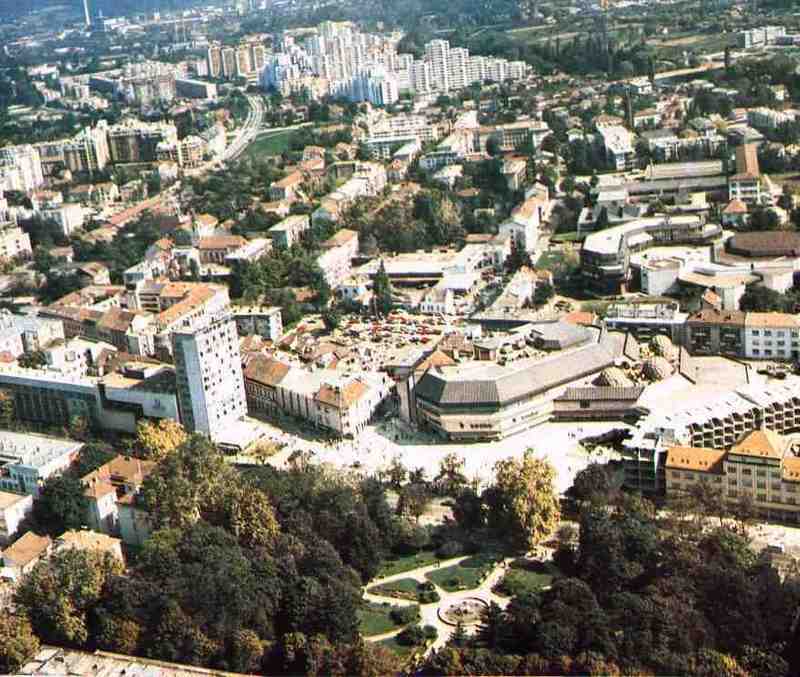
Arial view of the centre of Banja Luka with the department store Boska
|
|
5 th December 1978
After more than 17 years I have visited Bosnia. On the way to Mostar, where initially my project was suppose to happen, I stopped in Banja Luka to visit relatives like I used to do in childhood for summer holidays. Upon arrival in Banja Luka I was immediately overwhelmed and the course of my project's trajectory changed for good. I decided to stay and make the project in Banja Luka. The fact that I never reached Mostar somehow became irrelevant. I have encountered the physical space that preserved images from my childhood in some kind of a stop-frame.
The outline of the city has changed as I expected it would in the course of time.
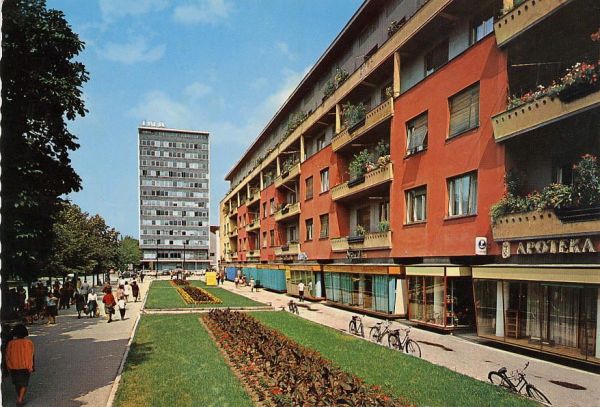
Residential building called "Titanic" use to stand on Boska's location today
But the old-fashioned department store “Boska” remained Banja Luka’s most distinguished landmark. The construction of Boska started after devastating earthquake in 1969 and opened the door for public on 5th December 1978. Boska was the last existing Yugoslav department store.
It represents concrete mega-structure inspired by the American “shopping mall” architecture from the 60’, designed without any direct formal relationship to the local heritage.
I developed affiliation with this building, and its recognition as some kind of a monument to the self-management system of former Yugoslavia paradoxically embodied in a department store, symbol of consumer society. Still, the system was long gone, after years of crisis and war, while its utility and function bears no signs of disruption: same interior decoration, same surveillance cameras, saleswomen in the same uniforms as ever, even some of the price tags resisted many years of inflation.
Titanic after the earthquake |
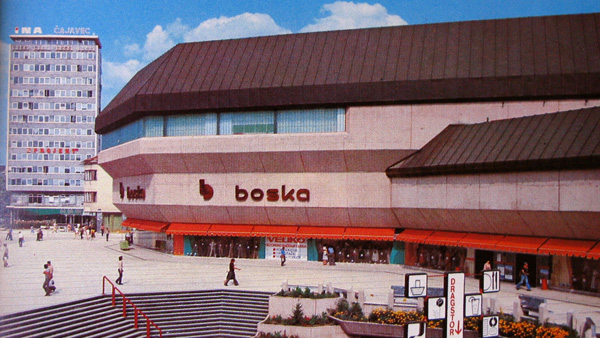 |
I felt certain urge to document this status quo before inevitable flux of time makes it disappear and blend into reality of today’s globalised consumerism. The absurd race with time began. The change was about to start, and you could feel suspense in the air.
However, this documentation wouldn’t serve as praise to the former communistic regime that put Boska into function. Neither it will criticise the effects of globalisation. It will try to create a space of reflection and possibility; possibility to re-posses our past.
|
Department store Boska is a public space open to all citizens of Banja Luka, but it sometimes seemed to me like I was the only one there. It was somehow difficult to overcome the feeling of an explorer who was slowly and very carefully approaching the location while engaging in contact with the workers, since inside there were no shoppers and only few passers by. It was during the process of research (i.e. exploration) that I found out carefully mounted places of memory and respect toward Boska's collective and it's history.
Indeed, this work was made inside Boska and talks about the people that work and exist in this space, which haven't changed since 1978. It was created through archiving and documenting with the means of video and photography.
|
Mustafa Ekic-Muki
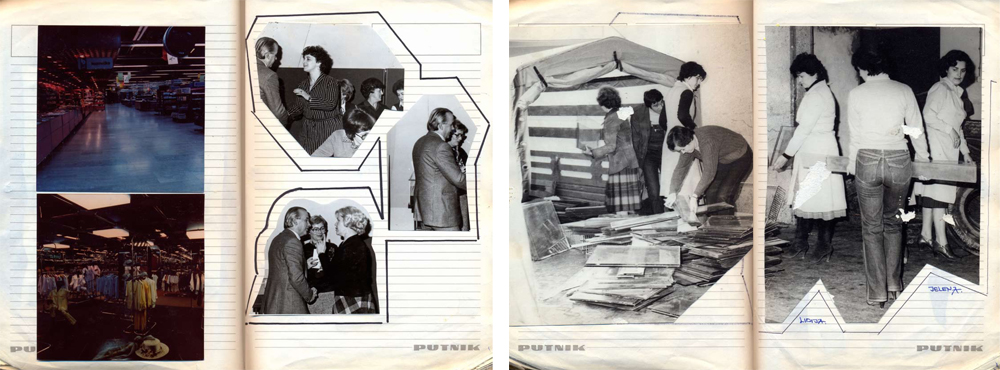 "Ever since the Comrade Tito died situation in society is very bad, therefore also in football", Muki's scrap-book, slide show, 2007-2008 "Ever since the Comrade Tito died situation in society is very bad, therefore also in football", Muki's scrap-book, slide show, 2007-2008 |
During my exploration of Boska I met Mustafa Ekic -Muki, a man that worked all of his life in Boska, in it’s administration department. From that time on, I saw Muki as some sort of an alter ego, which helped me to define my own position in relation to the subject of my research. He introduced me with the collection of Boska’s photographs taken by it’s workers which was hosted by him, so to say curated in one of the Boska’s meeting rooms. He also presented me with a scrap- book he made that represents a private log of Boska, compiled of personal and official pictures from the early days of this collective until today.
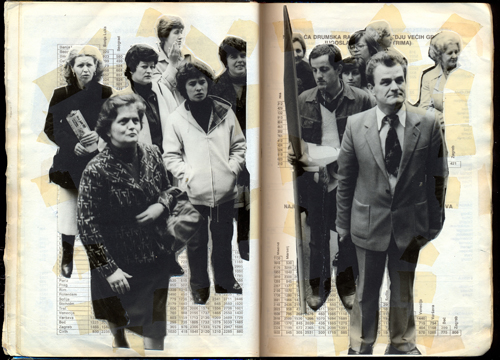
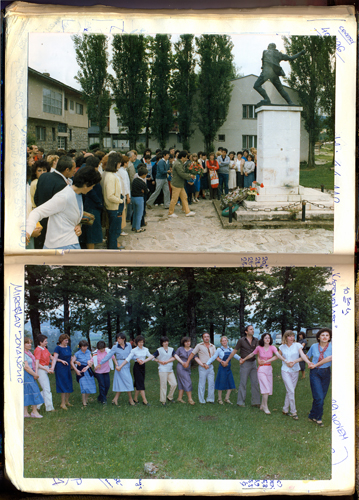
Ever since our first meeting Muki has done a lot to help me with the project and it was because we share the same goal: to reconstruct the history of this place from the personal point of view and to maintain this kind of an archive and document history.
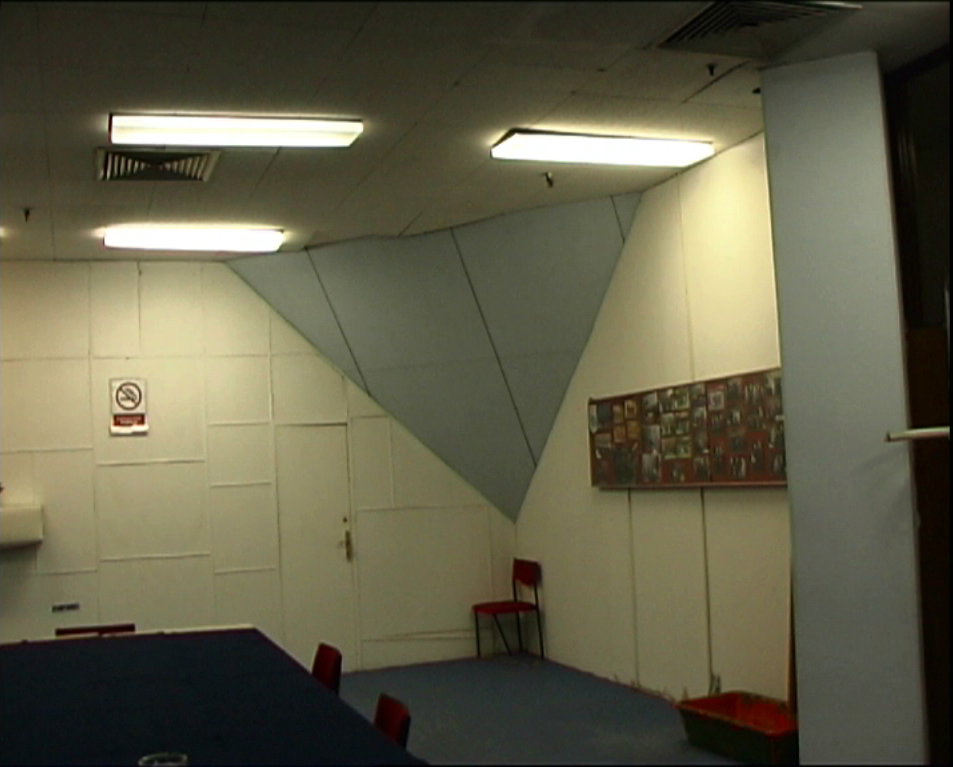 Boska's exhibition room with collages of photographs taken by it's workers |
|
Department store Boska is recently sold to a private company (the first private owner) and faces complete “make-over”. There will be no place for their memorabilia, furniture and exhibitions. Therefore my project aims to provide continuation of their existence in the world of contemporary art.
|
Mustafa Eki?-Muki was born in 1956 in Banja Luka. After receiving BA in economy and commerce he started to work in Boska in 1978 after the opening of the department store. He started as 'commercial referent’ and became the manager of the wholesale department. He was also the president of the Federation of the Trade Unions of Boska for two mandates. Muki was in charge of all the sport activities, celebrations and social gatherings, parties, excursions, etc. He organized the internal bingo lottery among the employees which he, according to his own statement, always 'fixed' so the most diligent workers would win. On one occasion, Muki took 1000 women to Trade Union-organized excursion and this enterprise he illustrated with several big photos from his scrapbook which today serve as the source of documents which at the same time establish the story of Boska and which play the main and marginal roles in it.
 "Ever since the Comrade Tito died situation in society is very bad, therefore also in football", Muki's scrap-book, slide show, 2007-2008 "Ever since the Comrade Tito died situation in society is very bad, therefore also in football", Muki's scrap-book, slide show, 2007-2008 |
|
INSTALLATION VIEW-Jeanine Hofland Contemporary Art, Amsterdam, 2011 INSTALLATION VIEW-Salon of the Museum of Contemporary Arts, Belgrade, 2009 INSTALLATION VIEW- Tirana International Contemporary Art Biannual, 2009 SLIDE SHOW-"Ever since the Comrade Tito died...", insert VIDEO INSERTS - 5. decembar 1978. PUBLICATION (pdf) - 5. decembar 1978. text by Jelena Vesic&Vladimir Jeric Vlidi INSTALLATION VIEW-SPAPORT, Banja Luka, 2008 http://tica-albania.org/TICAB/Episodes/episode-2.html |
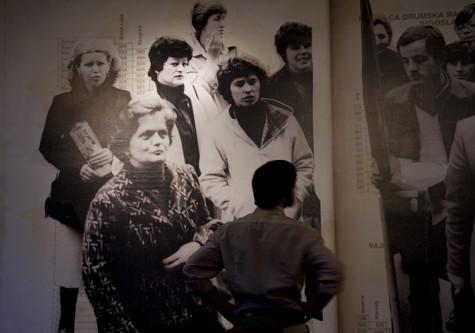 |